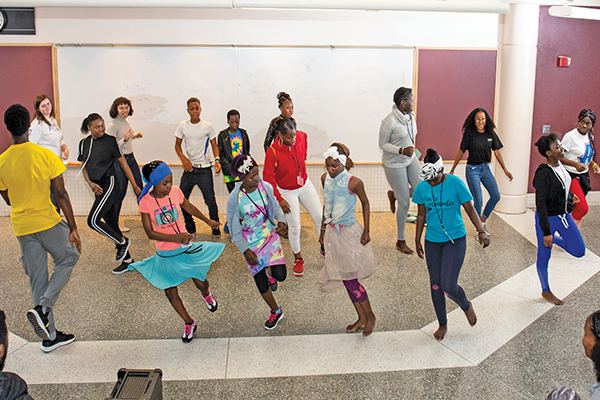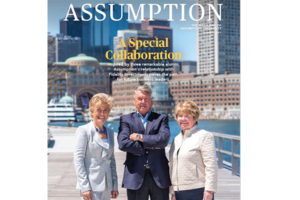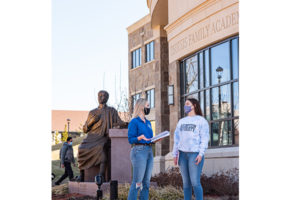
By Kaitlyn Friel ’19
Through Assumption’s Community Service-Learning (CSL) program, students are provided opportunities to “Light the Way” for others. ENG/SOC 225, a course that is over a decade old, was originally created by a sociology and an English professor with the intent of developing a CSL course to examine inner-city problems through literature and sociology texts. The course is taught by Professor Mike Land, Ph.D., who views inner-city problems through the television series The Wire. After watching the series and reading a number of texts, students apply what they have learned from the series to real-life experiences, such as volunteering.
Students enrolled in ENG/SOC 225 volunteer for 25 hours per semester at one of five after-school programs in Worcester: African Community Education, Boys and Girls Club of Worcester, Friendly House, Pernet Family Health Service, or Rainbow Child Development. Helping with home-work, teaching program beneficiaries cooking skills, offering support for at-risk children, recreational activities, and tutoring children who have experienced significant trauma are but some of the activities in which Assumption students participated.
“Students from Assumption exemplify the spirit of volunteerism and have been one of our consistent partners over the years. Our students and staff love to work with them every day,” said Kwame Yeboah, program director, African Community Education. “We really appreciate the time they commit to helping our students succeed academically and socially.”
During the spring semester, Kashmir Flood ’20, a sociology major and psychology minor from Cromwell, CT, spent her Saturday mornings volunteering with the African Community Education program. During her time there, she learned what it means to serve her community.
“It’s not often you take a class that helps you apply what you are learning to the real world. Prior to this course, I did not know there was an organization like African Community Education in Worcester and would not have had the wonderful opportunity to participate in it had I not taken the class,” Flood noted. “Often-times I find people really are passionate about issues around us and want to make a change but don’t know how to.”
Professor Land decided to use The Wire after witnessing various colleges throughout the country using this technique to better understand political, economic, and social issues in communities. The cable television series is set in Baltimore and emphasizes the real, everyday issues cities face. The course studies Season 4 of the show, which focuses on schools and the challenges faced by teachers, administrators, and students. The goal of watching The Wireis for students to connect what they have watched from the series to how they can better assist in the after-school volunteer programs.
For Jacob Walz ’21, a management major with a marketing and CSL minor from Westport, this course has taught him skills that he can carry over to his dream of working with a nonprofit after college. “I’ve learned a lot about strategies people use when they’re born into poverty,” he said. “Getting assistance from nonprofits may not be the most prevalent part of the average day, but I’m picking up on certain needs that can be met.”
Similar to Walz’s experience, students not only face these issues firsthand but also learn about the biases often associ-ated with life in urban areas. Through this course, students are exposed to another aspect of inner-city life during their volunteer hours with their commitment to social justice and service.
“Hopefully the examples of so many people, real and fictional, working in the trenches to make their communities better places to live serve as a challenge to not just express compassion, but to act on it in our individual lives,” Prof. Land stated.


